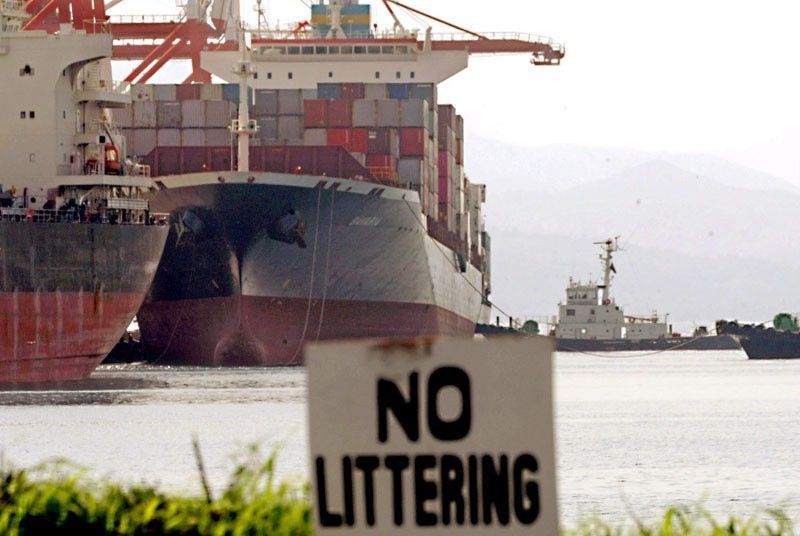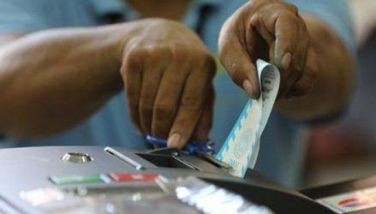Policy gaps leave Philippines 'wide open' to foreign trash — report

MANILA, Philippines — The country’s laws and regulations have fallen short in protecting the Philippines against the harmful effects of foreign waste dumping, two environmental organizations said in a report on the waste trade.
In a report released Wednesday, Greenpeace Philippines and EcoWaste Coalition stressed that policy loopholes such as the definition of waste in Philippine laws and waste trade for “recycling” allowed garbage from abroad to enter the country.
“Past experiences have repeatedly shown that the Philippines is wide open to both illegal and ‘legitimized’ waste trade. The country will remain vulnerable to continued exploitation if it does not take policy measure to close its borders against waste trade,” the report read.
Republic Act 6969 or the Toxic Substances and Hazardous Nuclear Wastes Control Act of 1990 prohibits any move "to cause, aid or facilitate the storage, importation and even in transit of any amount of hazardous waste."
Under the Ecological Solid Waste Management Act of 2000, it is also unlawful to import toxic wastes misrepresented as “recyclable” or “with recyclable content.”
However, Administrative Order 2013-22 of the Department of Environment and Natural Resources does not list plastic waste as hazardous waste. The order is the procedural manual for the implementation of RA 6969.
“As such, application of these policies may be limited,” the report noted.
Problem with recycling
Waste trade primarily for “recycling” and under certain conditions is legal in the Philippines. Garbage in the form of electronic waste, used lead acid batteries, plastic materials, used oil and fly-ash from coal power plants is allowed into the country.
“Even while waste importation for ‘recycling’ is allowed, there is no sufficient and effective monitoring whether the waste would be properly handled once they entered Philippine shores,” the report said.
The items marked for “recycling” from other countries also added to the already stretched landfills and few recycling facilities in the country.
Between 2013 and 2014, fifty-five container vans labelled as recyclable plastic scrap arrived in the Philippines from Canada and only belatedly discovered. The containers—which actually contained recyclable plastic, waste paper, household waste, electronic waste and used adult diapers—returned to Canadian shores in June 2019.
Protection from waste importation
In 2018, containers shipped from South Korea to Misamis Oriental were found to contain over 6,000 tons of contaminated plastic waste, used batteries, diapers and electronic equipment.
Around 150 containers of illegal waste were shipped back to the east Asian country in 2019. But the repatriation of the remaining 50 containers has not yet pushed through.
In May last year, a container of electronic waste from Hong Kong was also discovered in the Misamis Oriental Port. The trash—mislabelled as “assorted electronic accessories”—was brought back a month later.
'Ratify Basel Ban amendment'
Greenpeace and EcoWaste called on the government to immediately ratify the Basel Ban Amendment, which aims to prohibit the export of hazardous wastes and other wastes from developed to developing countries for any reason, including recycling.
“The Philippines still remains vulnerable to hazardous waste dumping under the guise of recycling by developed countries that are either not parties to the treaty (US) or have not ratified the Ban Amendment (Australia, Canada, Japan, New Zealand and South Korea). It is therefore imperative for the Philippines to ratify the Basel Ban Amendment,” they said.
The groups also urged the government to enforce a comprehensive ban on all waste imports.
The ban would allow the Philippines to focus on the country’s own waste management issues, improve the recycling and re-processing facilities and implement and promote a “zero waste” society.
“This proposal finds legal justification within the context of the Constitution and our laws. The government has the legal authority and mandate to take measures, although extraordinary and unprecedented, to protect the people’s fundamental right to a clean and healthy environment,” they said.
- Latest
- Trending































